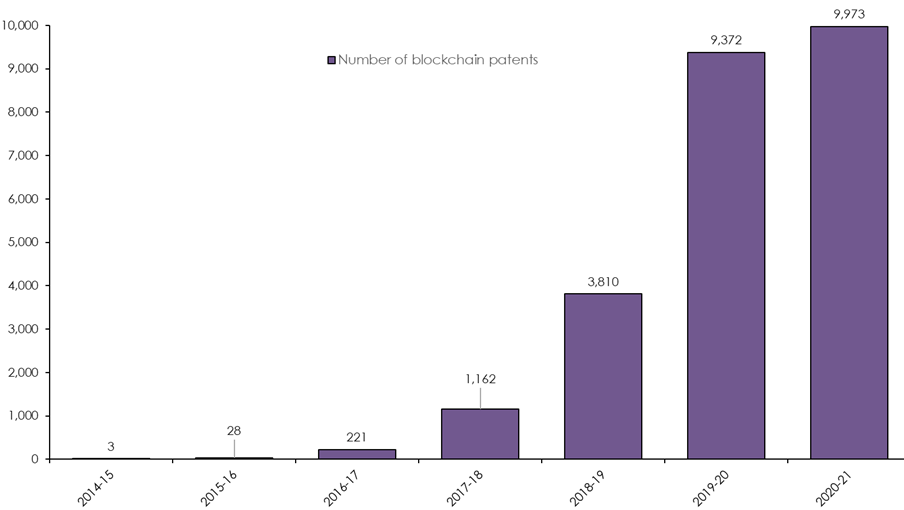Research carried out by Mathys & Squire, around the rise in global patents related to blockchain technology, has featured in an article published by City A.M. – click here to read the feature (p. 14).
An extended version of the article is available below.
There have been a record 9,973 global patents related to blockchain filed in the past year*, up from 3,810 two years earlier, shows new research carried out by Mathys & Squire.
The rush to secure new commercial applications for blockchain technology is driving R&D in the space. The development of new uses for NFTs and attempts to make core blockchain technology less carbon intensive are particular areas of focus for software houses.
Blockchain technology has the potential to help make supply chain data more reliable and up-to-date. The technology could help eliminate counterfeiting and trace the movement of goods within the supply chain. Possible applications include secure event ticketing and validating ethical supply chains – from organic food to conflict-free diamonds.
Dani Kramer, Partner at Mathys & Squire says: “Blockchain has the capacity to revolutionise sectors as diverse as insurance, healthcare and urban planning. The race to capture new commercial applications is the driving force behind R&D and patent filing in this area.”
“Cryptocurrency is just one element of blockchain technology. It’s a misconception that blockchain is only applicable to cryptocurrency trading or NFTs in the art market.”
Beyond blockchain’s more well-known applications, our research reveals technology for many other potential uses of blockchain has been patented in the last year, including:
- allowing insurers to analyse vehicle sensor data and build user profiles;
- enabling the secure storage and transmission of medical information;
- optimising traffic flows in urban areas; and
- optimising energy efficiency within the power grid.
Fears over crypto carbon footprint drives blockchain innovation
Another key area of innovation in the last year has been to make core blockchain technology greener after criticism of its carbon footprint. In 2019, Bitcoin mining consumed as much energy as the Netherlands**. Earlier this year Elon Musk u-turned on accepting Bitcoin as payment for Tesla vehicles over environmental concerns.
Efforts to make blockchain greener have focused on cryptocurrencies, with alternatives to energy-intensive ‘proof of work’ system of verifying transactions. Proof of work uses so much energy because to verify crypto transfers it requires computers to solve increasingly complex mathematical problems.
Dani Kramer says: “While the environmental impact remains a concern, crypto developers are already coming up with ways to reduce the carbon footprint of cryptocurrencies. Other blockchain applications, for example in the field of energy efficiency, already hold the potential to reduce emissions.”
The majority of blockchain patents for the last year (5,714 – 57% of the total) were Chinese in origin. The US came in second place, with 1,729 (17% of the total). 53 patents originated in the UK – just 0.5% of the global figure. Major filers for 2020-21 include insurance company Ping An, Chinese payment platform Alipay and US technology company IBM.
Number of blockchain patents filed per year

* Patents filed with World Intellectual Property Organization, year ending 30 September 2021
** University of Cambridge and International Energy Agency

